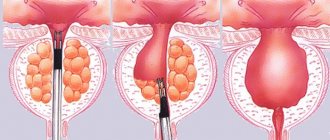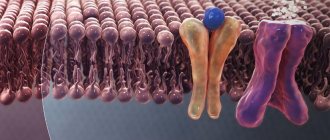Bacterial urethritis. The causative agents are: staphylococci, streptococci, E. coli, gardnerella, etc. Infection can enter the urethra through sexual contact, as well as due to its spread from the genitourinary tract with pyelonephritis, prostatitis, vesiculitis, urethral trauma. More than 230 strains of bacteria have been isolated that, under certain situations, can cause inflammation of the urethral mucosa.
The average duration of the incubation period for bacterial urethritis is 12-14 days (from 2 to 20 days). More often their clinical course is asymptomatic and sluggish. Less commonly, bacterial urethritis becomes acute.
Urethritis caused by diplococci similar to gonococci (pseudogonococci) usually occurs as acute urethritis.
Gardnerella, as a rule, causes low-symptomatic urethritis, often ending in self-healing.
Bacterial urethritis often (in 30% or more) results in complications (balanoposthitis, epididymitis, prostatitis, cystitis, etc.).
The main possible causes of burning after urination in women
- The leading cause of burning after urination is occupied by various infections. In women, due to the specific anatomical features - the proximity of the anal passage to the vagina and urethra, allows bacteria to freely penetrate into the urethra, then freely into the bladder and kidneys, because this canal in women is short and wide. A burning sensation can be a consequence of sexually transmitted infections - gonorrhea, trichomoniasis, urogenital chlamydia and other diseases. Such diseases are accompanied by purulent or mucopurulent discharge.
- Another equally common reason is unclean sex, poor intimate hygiene and the use of low-quality contraceptives, which destroy the natural microflora of the vagina and can cause contact dermatitis. In this case, opportunistic bacteria begin to multiply very quickly, because the local immunity that restrains them is disrupted.
- Burning after urination occurs with urethritis and cystitis. It is also accompanied by pain in the canal and lower abdomen and a feeling that the bladder is not completely emptied.
- Stones formed in the kidneys or bladder, when exiting through the urethra, injure its mucous membrane and provoke not only a burning sensation, but also the release of blood into the urine.
- Often, a burning sensation is caused by hygiene detergents due to an allergic reaction to the substances they contain.
What tests should I take if I suspect chlamydia?
Chlamydia trachomatis has some complications because the pathogen is intracellular.
It is difficult to culture and serological tests will not provide meaningful results.
Thus, chlamydia culture and ELISA will indicate the presence of chlamydia with an accuracy of only 60-70%.
The only informative method that can detect infection with 100% accuracy is PCR.
Chlamydia in men can be effectively treated with antibiotics.
The most common treatment consists of Azithromycin therapy.
Patients who have been infected through anal intercourse are prescribed Doxycycline.
The drugs are taken daily for 5-7 days.
Possible side effects of treatment: nausea, abdominal pain, diarrhea.
In case of infection with chlamydia, treatment is also prescribed to the sexual partner.
During the entire course of therapy, it is recommended to abstain from intimacy.
What is the most effective prevention of chlamydia?
There is only one truly effective preventive measure.
This includes regular condom use and annual STI testing.
Why does a burning sensation occur after urination in men?
In men, the length of the urethra is much longer than in women, so bacterial inflammation occurs less frequently in them, and among the main causes, in addition to sexually transmitted infections, the following can be identified:
- The consequences of inflammation of the urethra are urethritis.
- Urolithiasis, when sediments of urine, consisting of insoluble salts, irritate the mucous membrane, passing through the urethra.
- Most often, burning sensation after urination in men occurs in the presence of various diseases of the prostate gland (for example, prostatitis), which provoke a violation of the outflow of urine.
You can make an appointment with a doctor by phone
8-(4822)-33-00-33
or using the online registration system on the website
Make an appointment with a doctor
Possible diseases:
- urethritis - inflammation of the urethra;
- urolithiasis disease;
- trichomoniasis;
- vesiculitis - inflammation of the seminal vesicles;
- chlamydia;
- ureaplasmosis;
- orchitis - inflammation of the testicle;
- mycoplasmosis;
- prostatitis;
- cystitis - inflammation of the bladder;
- genital herpes;
- candidiasis;
- balanoposthitis - inflammation of the foreskin and glans penis;
- BPH;
- prostate cancer;
- epididymitis - inflammation of the epididymis;
- phimosis is a narrowing of the foreskin.
Most often, the cause of discomfort is prostatitis, urethritis and sexually transmitted diseases. To confirm the diagnosis, a comprehensive examination is carried out.
What needs to be done to identify the cause of burning after urination
First of all, you should not delay by self-medicating, but contact a specialist who will prescribe a clinical urine test, the results of which will determine the cause of dysuria. In this case, the presence of protein in the urine, a large number of leukocytes and bacteria will indicate the presence of an inflammatory process in the bladder and urethra. If red blood cells and salt crystals are found in the urine, this indicates the initial stage of urolithiasis. If there are no deviations from normal values, but there is a burning sensation after urination, then one can suspect the neurogenic nature of such a symptom. To more accurately identify the causes of burning, doctors prescribe an ultrasound of the kidneys, bacteriological examination of urine, a vaginal smear, and testing for sexually transmitted infections.
Mycoplasma urethritis.
They are caused by bacteria that have a plastic shell and contain DNA and RNA. The ability of mycoplasmas to take any form allows them to penetrate bacterial filters.
Infection with mycoplasma infection occurs primarily through sexual contact. Intrauterine infection of the fetus and during its passage through the infected birth canal have been established. Mycoplasma attaches to the urethral epithelium and can be transferred by sperm; in addition, it colonizes the foreskin. The incubation period lasts from 3 to 5 weeks.
There are no specific signs for mycoplasma urethritis. As a rule, urethritis of mycoplasma origin is chronic. In this case, there are often lesions of the prostate gland, seminal vesicle, and epididymis, which leads to infertility. By attaching to the head of the sperm, mycoplasma can reduce its fertilizing ability. Under certain conditions, mycoplasma infection can cause inflammatory processes in the genitourinary organs (cystitis, pyelonephritis). Urogenital mycoplasmosis is often combined with intestinal damage (enterocolitis).
Treatment of burning after urination
Treatment methods are chosen only by a specialist after a thorough examination and depend on the cause that causes the burning sensation. Inflammatory processes in the urethra and bladder are treated with antibacterial drugs, to which the bacteria causing the problems are not resistant. With the development of urolithiasis and the presence of salts in the urine, acidic or alkaline drinking is indicated, depending on the type of salts. In cases where stones have formed in the kidneys and ureters, it is recommended to crush them using a special ultrasonic device, and, in extreme cases, to remove them surgically.
Burning after urination is an unpleasant and dangerous symptom, so consultation with an experienced specialist and examination should be prompt.
Return to list
Prevention
It is believed that a healthy lifestyle, quitting smoking and alcohol abuse, as well as a balanced diet reduces the risk of developing pathology. It is also recommended that in old age, regularly consult a urologist.
Dear patients! Remember that only a qualified doctor can make an accurate diagnosis, determine the causes and nature of the disease, and prescribe effective treatment. You can make an appointment with our specialists or call a doctor at home by calling 8-(4822)-33-00-33
Be healthy and happy!
Burning sensation in the penis as a symptom of prostatitis
Prostatitis is an inflammation that affects the prostate gland.
There are two types of prostatitis: acute (bacterial, non-bacterial) and chronic.
Acute bacterial prostatitis is most often caused by E.coli, Klebsiella and Proteus bacteria, various viruses, fungi, and STIs.
Chronic bacterial prostatitis is also a consequence of the pathogens described above.
In both cases, the clinical picture is similar, patients note the following symptoms:
- Cutting, burning in the penis, feeling of tension or heaviness in the perineum
- Significant increase in frequency of urination
- Feeling of incomplete emptying of the bladder (desire to repeat deurination after a few minutes)
- Dysuria (difficulty urinating)
- Pain in the testicles and groin area
- Low sexual desire, erectile disorders
- Dyspareunia (painful intercourse)
- Premature or even painful ejaculation
The treatment recommended by your doctor will depend on the type of prostatitis.
Bacterial inflammation is treated with antibiotics and NSAIDs.
Non-infectious prostatitis, which is often associated with congestive processes in the pelvis, requires a change in the patient’s lifestyle.
Diagnostics
A urologist-andrologist is involved in establishing the cause of pain. During the conversation, the doctor asks the man when the symptom appeared and what manifestations it was associated with. The specialist studies the dynamics of the development of the disease and identifies possible provoking factors. Then he conducts an external examination, paying attention to the condition of the meatus, prepuce and head, the presence of edema, hyperemia and other changes in the genital organs. By palpation, the urologist detects tumor-like formations and regional lymphadenitis. Additional examination includes the following procedures:
- Digital examination of the prostate.
The doctor palpates the prostate gland through the rectum. The technique allows you to evaluate the shape, size and homogeneity of the structure of the organ. Used to diagnose space-occupying lesions. Makes it possible to suspect inflammation based on pain on palpation and an increase in the size of the gland. - Ultrasonography.
Ultrasound of the urethra is a safe, non-invasive basic examination used to assess the condition of the urethra and detect injuries, stones and foreign objects. Ultrasound of the bladder is informative for cystitis and cystolithiasis. An ultrasound of the kidneys shows all types of stones, hydronephrosis due to stone blockage and other changes. For prostate diseases, ultrasound of the prostate gland is indicated. - Radiation diagnostics.
Retrograde urethrography is considered the most accurate way to diagnose urethral injuries. To increase information content, it is supplemented with excretory urography. X-ray positive stones are clearly visible on survey photographs. To identify soft uric acid and protein stones, excretory urography or computed tomography is prescribed. - Endoscopic methods.
When performing urethroscopy, the position of the foreign body or calculus, the condition of the surrounding tissues are determined, and, if possible, removal is carried out. To confirm blockade of the kidney or ureter in renal colic, chromocystoscopy is performed. In case of chronic cystitis outside of exacerbation, cystoscopy is sometimes performed. During endoscopic examinations, according to indications, material is taken for morphological analysis. - Other techniques.
In cases of urethral obstruction, urodynamic studies are indicative. Men with suspected prostate cancer are prescribed an extensive examination, including transrectal or saturation biopsy, MRI of the prostate gland, radiography of the chest, scintigraphy of skeletal bones. - Lab tests.
Confirmation of STIs is carried out by microscopy, microbiological examination, RIF, ELISA or PCR. With nonspecific inflammatory lesions of the urinary tract, bacteria, leukocytes, and red blood cells are found in the urine. In men suffering from prostate diseases, PSA levels are determined. Biopsies are studied during cytological or histological analysis.










